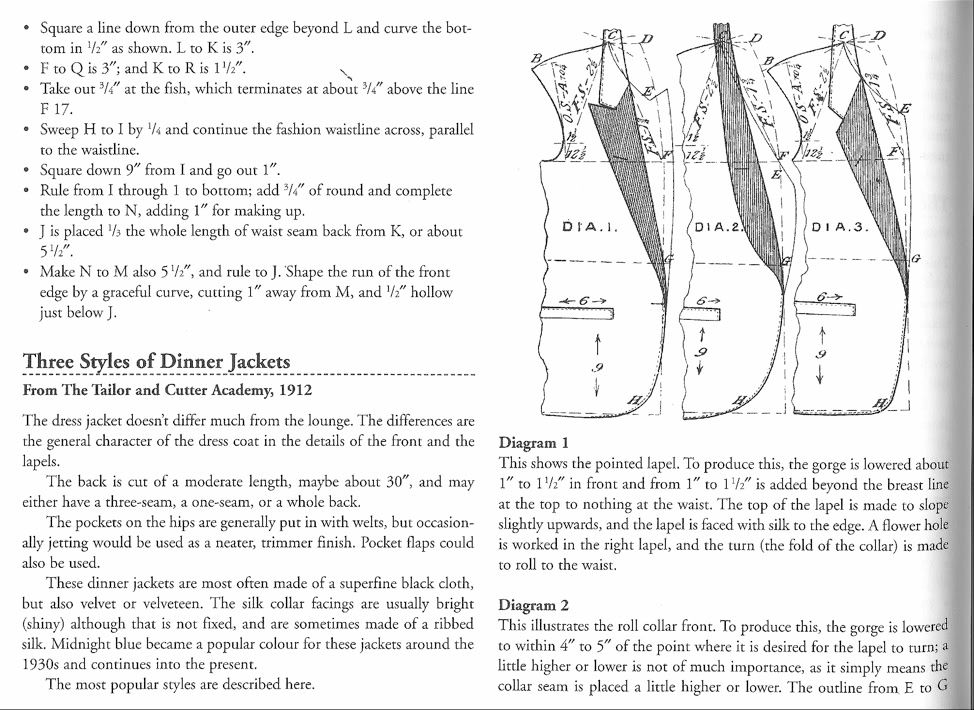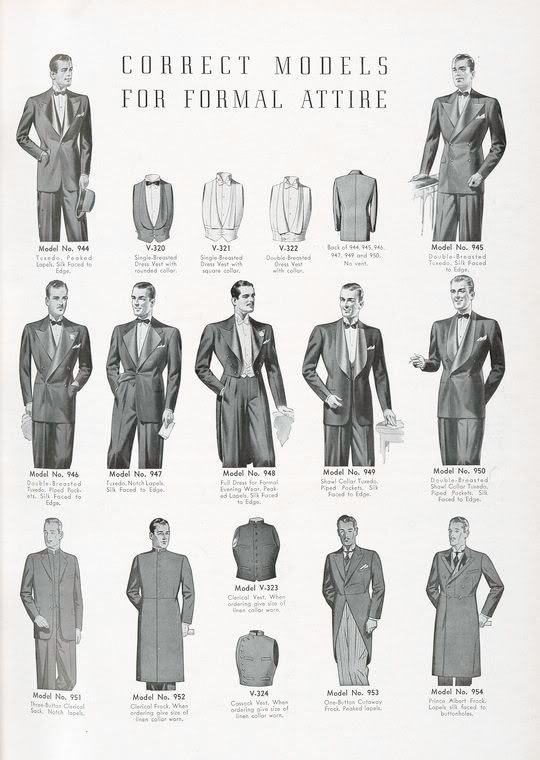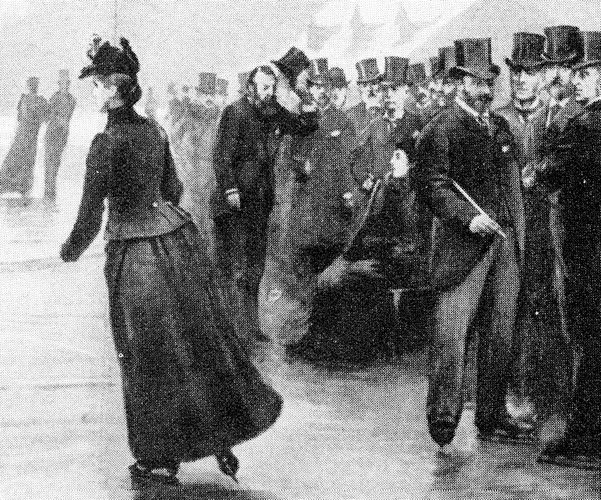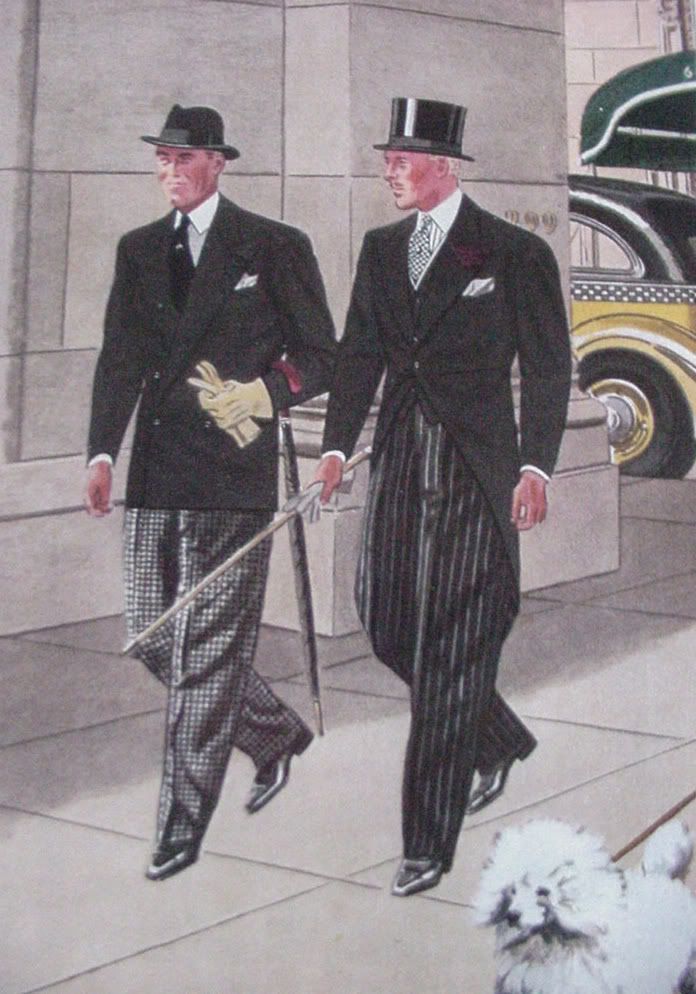http://www.cutterandtailor.com/forum
A Sartorial Crime?
The step lapel on a dress lounge/dinner jacket is perfectly classical. The reason is simple: informal dinner clothes are a very casual form of evening dress. Perhaps it is even preferable that such informal dress for the dinner table have a step lapel 
http://www.cutterandtailor.com/forum
http://www.cutterandtailor.com/forum
Last edited by Sator on Thu Nov 12, 2009 10:24 pm, edited 1 time in total.
I believe that Mr. Amies is just expressing his own view (obviously with his experience he is entitled to), and I take it as just that...
I remember his earlier insistence on 4 to 5 high-buttoning coats as "traditional English look" as well...
I remember his earlier insistence on 4 to 5 high-buttoning coats as "traditional English look" as well...
-
storeynicholas
Here we go again and, again,the fish rise, in the same pool, to the perfectly placed bait as you, sator, sit there on the bank, munching some tasty snack, just waiting for the water to BOIL. Please, then, let us see a photograph of some great and good person before 1980 in a DJ with a step lapel. I know that you have something to hand already just, waiting, waiting...... as you sit there smiling.....Sator wrote:The step lapel on a dress lounge/dinner jacket is perfectly classical. The reason is simple: informal dinner clothes are a very casual form of evening dress. Perhaps it is even preferable that such informal dress for the dinner table have a step lapel
NJS[/i]





Is that enough for you?
The reason is very simple: informal dinner clothes are meant to be a rather casual form of dress. They are NOT meant to be worn out to formal events such as balls, the opera etc. That is why you are allowed to wear them with an attached turn down collar shirt. And that is why the informality of a step lapel is perfectly appropriate to the garment.
However, the trouble is that people wear them as some sort of bastardised ersatz formal dress these days. If that must be the case then it should be worn in a way that makes it as formal as can possibly be. I think that means detachable, preferably stand up collar, waistcoat, patent pumps and a coat with double breasted style lapels.
However, in so far as it is preferable that formal evening dress be correct full dress ie tails - then, perhaps, one might consider the informality of the step lapel and attached turn down collar preferable when informally 'dressing for dinner'.
With that, I do think that you of all people, NJS, will appreciate exactly where I am coming from, and that I am being far less controversial than it may seem at first glance.
http://www.cutterandtailor.com/forum
Last edited by Sator on Thu Nov 12, 2009 10:25 pm, edited 1 time in total.
-
storeynicholas
I absolutely and poitively decline to criticize Sean Connery's portrayal of James Bond. Under Terence Young's tutoring and direction, he produced the best screen Bond: maybe not the Bond of the books (although Ian Fleming like the first films) - but just the best of the bunch. I don't agree with your remarks on formality of DJ - no one wears full evening dress to the opera anymore and DJ is DJ as it has evolved - I think that a stiff shirt with a DJ looks forced and out of place. I do know that there were people such a Sir John Mills and even Patrick Mcnee as Steed who had toyed with notch lapels on DJs - but it seems to have been an evanescent fashion. what are the other illustrations from, by the way?
NJS
NJS
Notice that Sean Connery is sitting - at the dinner table. For that purpose his dress is absolutely correct. The problem is when informal dinner clothes are taken into more formal settings. For that, it has to be adapted to the new purpose, just as morning coats were adapted for formal dress to take DB lapels when they ceased being informal sports coats for skating, horse riding and the like:


The other illustrations are of mixed provenance. The one for the 1890s is from John Peacock whose illustration can sometimes be sourced to period fashion plates and are generally well researched. The Tailor and Cutter Academy, London 1912 exert comes from Doyle (see my Bibliography thread). Others are American catalogues from c1920s-30s.
http://www.cutterandtailor.com/forum


The other illustrations are of mixed provenance. The one for the 1890s is from John Peacock whose illustration can sometimes be sourced to period fashion plates and are generally well researched. The Tailor and Cutter Academy, London 1912 exert comes from Doyle (see my Bibliography thread). Others are American catalogues from c1920s-30s.
http://www.cutterandtailor.com/forum
Last edited by Sator on Thu Nov 12, 2009 10:25 pm, edited 2 times in total.
-
storeynicholas
I am not convinced by your suggestion that there are informal and formal DJs. Formerly, there were smoking jackets (for home); dinner jackets (for hotels, stag dos etc) and full fig - so the need for an informal and a formal DJ did not exist. Now you have to be kidding that more than those equal to 1% of the male population (if that) possess different types of DJ or even one! The DJ is increasingly the only formal evening dress that most people ever wear and, maybe, that is why the styles now worn are quite settled as DB plus DB peaked or shawl (roll) lapel or SB plus peaked DB or shawl lapel. Very few would probably even contemplate a notch lapel on a SB DJ and I am far from persuaded that such a model was ever worn by, say, the Duke who certainly knew his onions in this sphere. I said that I refused to criticize Sean Connery's Bond and that stands - but please find us a photograph of a real style leader in a notch lapel DJ before (I said 1980 previously) - better make it before 1960.
NJS
NJS
- culverwood
- Posts: 402
- Joined: Fri Jun 23, 2006 3:56 pm
- Location: London
- Contact:
As almost always you are right. I was surprised looking though my Spy prints to see that amost all morning coats were drawn with notch lapels.Sator wrote:Notice that Sean Connery is sitting - at the dinner table. For that purpose his dress is absolutely correct. The problem is when informal dinner clothes are taken into more formal settings. For that, it has to be adapted to the new purpose, just as morning coats were adapted for formal dress to take DB lapels when they ceased being informal sports coats for skating, horse riding and the like:
-
storeynicholas
Some Spy cartoons also show some of these coats with facings.culverwood wrote:As almost always you are right. I was surprised looking though my Spy prints to see that amost all morning coats were drawn with notch lapels.Sator wrote:Notice that Sean Connery is sitting - at the dinner table. For that purpose his dress is absolutely correct. The problem is when informal dinner clothes are taken into more formal settings. For that, it has to be adapted to the new purpose, just as morning coats were adapted for formal dress to take DB lapels when they ceased being informal sports coats for skating, horse riding and the like:
NJS
True. No such distinction is meant to exist. Nor does such a distinction have any right to exist. However, what is one to do when one is invited to wear informal dinner clothes (aka black tie) to what would traditionally be a formal eventstoreynicholas wrote:I am not convinced by your suggestion that there are informal and formal DJs.
NJS
That ends up creating a distinction. An unfortunate one but a distinction nonetheless: informal dinner dress in it's correct place and its incorrect place as ersatz pseudo-formal dress (gasp). Of course, there is the option of doggedly insisting on wearing white tie to traditionally formal events even if the invitation states "black tie".
http://www.cutterandtailor.com/forum
Last edited by Sator on Thu Nov 12, 2009 10:25 pm, edited 1 time in total.
-
storeynicholas
I understand your point. I agree that one could quite properly wear full evening dress to a black tie 'do'; however, it would make a bit of a scene, one suspects and, therefore, I guess that most people probably wouldn't (out of all those in the 0.1% or so of the population with the moth-balled option) .Sator wrote:True. No such distinction is meant to exist. Nor does such a distinction have any right to exist. However, what is one to do when one is invited to wear informal dinner clothes (aka black tie) to what would traditionally be a formal eventstoreynicholas wrote:I am not convinced by your suggestion that there are informal and formal DJs.
NJS?
That ends up creating a distinction. An unfortunate one but a distinction nonetheless: informal dinner dress in it's correct place and its incorrect place as ersatz pseudo-formal dress (gasp). Of course, there is the option of doggedly insisting on wearing white tie to traditionally formal events even if the invitation states "black tie".
NJS
Agreed. I remain firmly of the opinion (controversial though it may be) that when "black tie" is inappropriately requested for a type of event that traditionally demands formal dress, it is perfectly correct to wear full dress.storeynicholas wrote: I agree that one could quite properly wear full evening dress to a black tie 'do'
NJS
This, in fact, is exactly what seems to be going on here:

http://www.cutterandtailor.com/forum
Last edited by Sator on Thu Nov 12, 2009 10:25 pm, edited 1 time in total.
- culverwood
- Posts: 402
- Joined: Fri Jun 23, 2006 3:56 pm
- Location: London
- Contact:
Last edited by culverwood on Fri Oct 10, 2008 3:33 pm, edited 1 time in total.
-
storeynicholas
Great photograph - George Sanders and Ronald Colman wouldn't let the side down!Sator wrote:Agreed. I remain firmly of the opinion (controversial though it may be) that when "black tie" is inappropriately requested for a type of event that traditionally demands formal dress, it is perfectly correct to ear full dress.storeynicholas wrote: I agree that one could quite properly wear full evening dress to a black tie 'do'
NJS
This, in fact, is exactly what seems to be going on here:
NJS
Surely we would get into less of a muddle if we thought less about clothes of different formality, but rather the events? The dinner jacket, when worn formally (i.e. to a semi-formal event) requires formal features, such as point lapels, and similarly for a formal daytime wedding. In the time of the old fashion plates, the clothes shown were worn to events of lower formality than we would now wear the same dress code to, so consequently are of less formal cut.
The matter is not so much one of period (that is, it was done in 1900 but not now), but rather of occasion. Were Sator really to wear his step lapel dinner jacket every day (assuming he has no wife dining with him...), or even pop into town in his tweed frock coat, then he would be quite right to wear such coats as we see in his pictures. But on the other hand, there is really no question that all dinner jackets sold now will be used as formalwear, in which case the step lapel must be incorrect.
Without overdoing it, perhaps the best option is to seriously revive the old practice of mixing black and white tie at events. I have not worn white tie to a black tie event myself (I am considered eccentric enough as it is), but I would be interested to hear whether any of you have tried the scheme yourselves, rather than simply become the proponent.
The matter is not so much one of period (that is, it was done in 1900 but not now), but rather of occasion. Were Sator really to wear his step lapel dinner jacket every day (assuming he has no wife dining with him...), or even pop into town in his tweed frock coat, then he would be quite right to wear such coats as we see in his pictures. But on the other hand, there is really no question that all dinner jackets sold now will be used as formalwear, in which case the step lapel must be incorrect.
Without overdoing it, perhaps the best option is to seriously revive the old practice of mixing black and white tie at events. I have not worn white tie to a black tie event myself (I am considered eccentric enough as it is), but I would be interested to hear whether any of you have tried the scheme yourselves, rather than simply become the proponent.
-
- Information
-
Who is online
Users browsing this forum: No registered users and 73 guests
